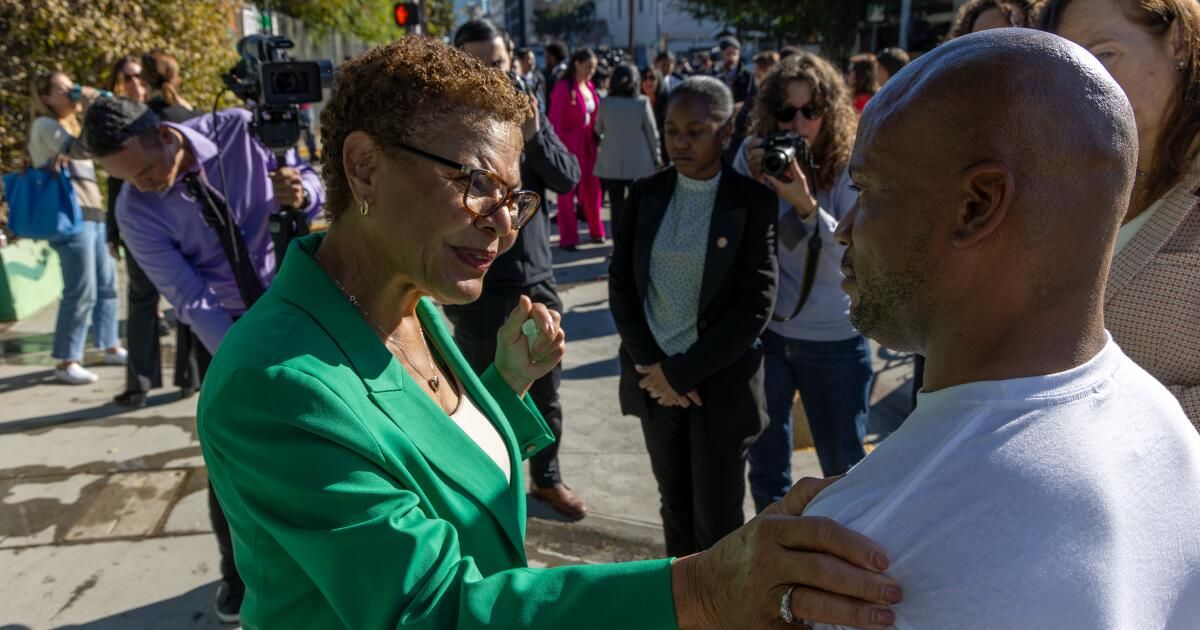to the editor: I was surprised to learn that Mayor Karen Bass lifted the state of emergency related to homelessness (“Mayor Bass lifts state of emergency on homelessness. But 'crisis persists'”. November 4). Major existential threats to maintaining our progress in reductions are about to become reality.
Los Angeles County is at risk of losing thousands of housing vouchers over the next two years. The financing of more than 6,000 pandemic-era emergency vouchers will expire in 2026. Thousands more vouchers will be lost to the Department of Housing and Urban Development policy changes that reject decades of researched best practices.
Additionally, the county faces a Deficit of 300 million dollars for homeless services next fiscal year due primarily to reduced tax revenue and the cessation of time-limited state funding. The city's budget remains precarious.
The federal government is shut down and everyone who relies on SNAP to make ends meet is having a much harder time doing so, while impending changes to Medicaid could strip thousands of Angelenos of health care coverage next year.
Emergency or not, solving homelessness requires resources and we are losing some important ones right now. I hope to see more coverage of these threats in the Los Angeles Times, as I think the article on the emergency declaration could have benefited from this context.
Robert Morrison, Los Angeles
..
to the editor: The mayor is not wrong: there has been progress on homelessness, especially in Hollywood, where years of coordinated work have reduced homelessness. in half.
Hollywood has certainly benefited from the mayor's Inside Safe initiative and the county's initiative. Hollywood 2.0 Program. But if we want to continue moving forward, we must understand exactly how and why this progress has occurred. Our impulse cannot make us think that the problem is solved.
The next few years should be about doing more of what works and less of what doesn't, and that requires a clear look at what drives improvement before acting as if everything is solved.
We need resources and policies that strengthen collaboration at the neighborhood level, along with transparent data and progress tracking to guide strategy.
The run-up to the Olympic Games is a vital window for systems to continue moving towards affordable housing, liveability and dignity, not last-minute “clean-ups” that simply mask visible homelessness.
If we stay aligned, focused, and grounded in what works, we will continue to move forward together.
Brittney Weissman, Los Angeles
This writer is executive director of the Hollywood Homeless Coalition 4WRD.
..
to the editor: Los Angeles is right to celebrate two years of declining homelessness. However, The Times has also reported that Rand discovered that Los Angeles' annual count is missing people sleeping without tents or vehicles. These people are the hardest to reach. If that Los Angeles population is not counted, the “decline” is smaller than it seems and services can be redirected.
Every time the City Council mentions progress, the public should also see a second number: how many people were probably not included and in which neighborhoods. This transparency is important and relevant because outreach teams and community organizations are the ones who need to be aware of the people they are not reaching.
We cannot say that the emergency is over for people who never appeared in the data.
Kendall Lyons, Los Angeles












